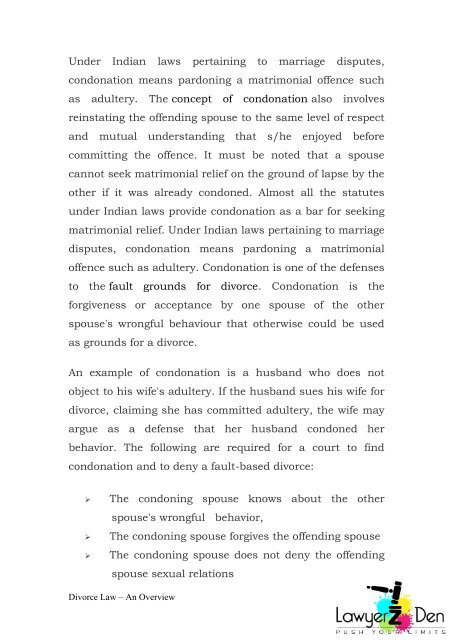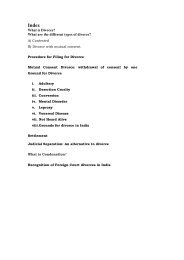DIVORCE LAW
You also want an ePaper? Increase the reach of your titles
YUMPU automatically turns print PDFs into web optimized ePapers that Google loves.
Under Indian laws pertaining to marriage disputes,<br />
condonation means pardoning a matrimonial offence such<br />
as adultery. The concept of condonation also involves<br />
reinstating the offending spouse to the same level of respect<br />
and mutual understanding that s/he enjoyed before<br />
committing the offence. It must be noted that a spouse<br />
cannot seek matrimonial relief on the ground of lapse by the<br />
other if it was already condoned. Almost all the statutes<br />
under Indian laws provide condonation as a bar for seeking<br />
matrimonial relief. Under Indian laws pertaining to marriage<br />
disputes, condonation means pardoning a matrimonial<br />
offence such as adultery. Condonation is one of the defenses<br />
to the fault grounds for divorce. Condonation is the<br />
forgiveness or acceptance by one spouse of the other<br />
spouse's wrongful behaviour that otherwise could be used<br />
as grounds for a divorce.<br />
An example of condonation is a husband who does not<br />
object to his wife's adultery. If the husband sues his wife for<br />
divorce, claiming she has committed adultery, the wife may<br />
argue as a defense that her husband condoned her<br />
behavior. The following are required for a court to find<br />
condonation and to deny a fault-based divorce:<br />
‣ The condoning spouse knows about the other<br />
spouse's wrongful behavior,<br />
‣ The condoning spouse forgives the offending spouse<br />
‣ The condoning spouse does not deny the offending<br />
spouse sexual relations<br />
Divorce Law – An Overview









